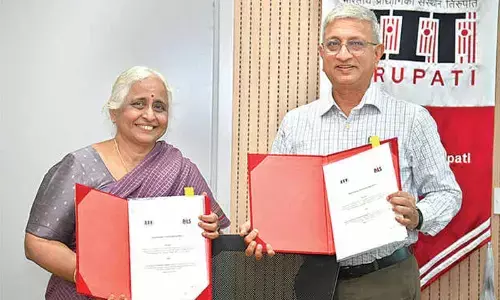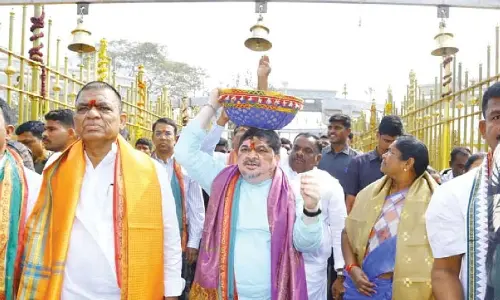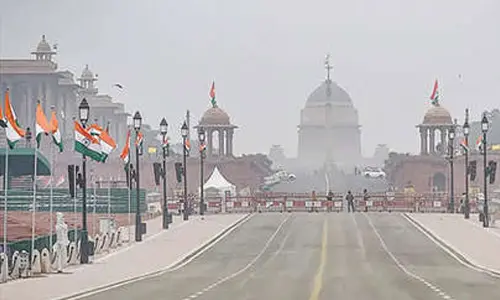Startup cradle: Home of unicorns looks beyond Silicon Valley tag

Startup cradle: Home of unicorns looks beyond Silicon Valley tag
Bengaluru continues to hold and cherish the 'Silicon Valley' tag despite infrastructure challenges, soaring land prices. It continues to be the home for 'unicorns' and 'soonicorns'.
Bengaluru: Bengaluru continues to hold and cherish the 'Silicon Valley' tag despite infrastructure challenges, soaring land prices. It continues to be the home for 'unicorns' and 'soonicorns'. The Karnataka capital is successfully facing competition from states like Uttar Pradesh and Telangana and is now looking beyond being a tech hub to also taking strides in the manufacturing arena. Along with the software industry, Bengaluru has also established itself as an ideal destination for investments in aerospace, defence and space sectors with huge opportunities in the state. Karnataka is now a leader in space and defence sectors and has emerged as India's biggest space cluster. It is also the second biggest manufacturer of electrical machinery.
Salil Ravindran, an advisor, mentor and independent Board member to many startups in India and abroad, told IANS, "Bengaluru was ranked 23rd among the top 30 global startup ecosystems in 'The Global Startup Ecosystem Report 2021' by Startup Genome and was ranked 10th in the top 1,000 cities globally by Startup Blink." Nearly half of the 80-odd Indian startups that became Unicorns are based in Bengaluru and it cannot be a coincidence but due to its established world-class educational institutions, rich technical talent pool, conducive government, and pleasant weather. This is also aided by having the most cosmopolitan, multi-cultural and westernized customer base across India, he explained.
Karnataka Minister for Large and Medium Industries Murugesh Nirani told IANS, "Our start-up ecosystem seems to be thriving if one looks at the number that have turned unicorns already this year. A total of 10 startups have entered the prestigious $1 billion valuation club as of April, with six of them achieving this status in just the past week. Moreover, Bengaluru has turned out to be a hub, contributing five of these. The list includes companies from fintech, health tech, insurtech, social commerce sectors, among others."
Aprameya Radhakrishna, Co-founder and CEO, Koo explained, Bangalore is the cradle of the startup ecosystem in India. It is the startup capital of India. "We have over 10,000 startups with ideas that are both disruptive and exciting, and many more that take shape, each year," he says.
"We are home to some of the biggest startups-turned-unicorns, which have established a presence not just across India, but also globally. What makes Bangalore - the startup city - stand out, is not just the number of startups that emerge each year, but the overall ecosystem that supports these startups," he says.
Aprameya Radhakrishna further says that in addition to top-class colleges and institutions, the city has a vast pool of technical talent that is eager to work on the most challenging and innovative technologies and platforms. Bangalore also hosts several hackathons from where the best talent is often cherry-picked.
The city is home to multiple incubation centres that offer ample opportunities to budding entrepreneurs to access seed funds and initial capital that is needed for building prototypes, product trials and for go-to-market strategies, he says.
Bangalore has several collaborative and co-working spaces that ease the process of establishing an 'office' - where resources can come together, connect and work to attain a common goal. All of this, backed by favorable government policies, housing and infrastructure, and a buzzing nightlife, has played a key role in reiterating Bangalore's position as one of the hottest startup hubs in the world. All these reasons have contributed to the made-in-India platform - Koo - choosing to be part of the startup ecosystem in Bangalore, Aprameya Radhakrishna underlines.
In May 2021, Koo raised $30 million in Series B funding round led by Tiger Global, with existing investors like Accel Partners, Kalaari Capital, 3one4 Capital, Blume Ventures and Dream Incubator also participating. "As we move ahead, backed by our unique language features which provide an immersive experience, we are confident of outperforming ourselves, and scaling at a rapid pace to hit 100 million downloads in the next one year," he said. However, Jairam Srinivas, Director General, Confederation of Indian MSME in ESDM and IT explained that, the government of Karnataka being the promoter should have a long term vision and has much to do in creating a manufacturing base rather than focusing on web based startups. These startups will not have shelf life beyond five years.
"Recently Karnataka minister made an announcement of allotment of 200 acres of land for a special industrial zone near Bengaluru. There are five national and state trade bodies in the state that absolutely had no idea of it. When the question was raised in this regard in the Lok Sabha, the State Minister for IT Rajiv Chandrashekar said he will answer the question after collecting data," he stated.
"The flights that flew down to Bengaluru will have to go to Bangladesh, Sri Lanka for maintenance. The government didn't take proactive measures in developing KempeGowda International Airport (KIAL) and the country's largest Maintenance, Repair and Overhauling (MRO) unit now is coming up in Noida, Uttar Pradesh. Since Karnataka couldn't acquire land, UP has got the lucrative defence projects including manufacturing of 'AK 205' rifles. The land costs in and around Bengaluru is about Rs 2.5 crore per acre today. Infrastructure is not the focus of the Karnataka government," Jairam Srinivas explained. Jairam Srinivas further underlined Karnataka has to learn from One District and One Product 'ODOP' project of Uttar Pradesh. Murugesh Nirani, Minister for Large and Medium Industries, explained, Bengaluru, along with Paris and Singapore, stand out for high access as well as quality and activity of funding.
"The Bengaluru ecosystem is ideal and unique - R & D departments of startups, 85 chip designing houses. Karnataka is also the world's 4th largest technology and innovation cluster and home to more than 400+ global R & D centers. Around 60 per cent of biotechnology companies in India have a base in Bengaluru," he said.
Domestic and multinational corporations, academic and industry, defence, product, and user organizations - all coexist in one metropolitan city. This means that future innovations are planned and developed in Bengaluru and will also be first to be used here, says Minister Nirani.
"Recently Bengaluru was ranked 23rd among the top 30 global startup ecosystems by policy advisory and research organization Start-up Genome's The Global Startup Ecosystem Report 2021. Bengaluru has an ecosystem value of $53 billion. Bengaluru's ranking was also boosted by healthy access to growth capital, demonstrated by recent large funding rounds from food delivery platform Swiggy (USD 1.3bn), social media company ShareChat (USD 502m) and EdTech company Byju's (USD 460m)," Nirani explained. Bengaluru will be the fastest growing city in the world for the next 15 years as its GDP is projected to grow at 8.5 per cent until 2035, according to the Bengaluru Innovation Report 2019. India will be home to 17 of the 20 fastest-growing cities in the world between 2019 and 2035 among the world's 780 major cities, he underlined.
Recently, Karnataka revised its EV Policy and has introduced a road tax exemption for EV vehicles with no registration fee. Investors in EV Sector get 15 per cent capital subsidy, five years production incentive subsidy 100 Stamp Duty Exemption, 100 per cent Only 0.1 per cent registration fee, 50 per cent subsidy on ETP (Plant) costs and 50 per cent on skill development subsidy. The government has announced a 50 per cent stipend, Nirani explained.
Investors interested in establishing an EV cluster in the state will be allowed in 200-250 acres of Harohalli. The land acquisition process from KIADB is nearing completion. There are more than 45 electric vehicle startups in the state and over 400 R and D centres, Minister Nirani said.
Salil Ravindran explains, the conditions have never been more ideal than now, with startups challenging and even acquiring established players (PharmEasy to buy 26 year old Thyrocare, BharatPe to take over 37 year old PMC Bank, Byju's buys 33-year old Akash Institute, Groww buys 13-year old Indiabulls MF business, etc). It's raining unicorns in India and Bengaluru has emerged not just as an undisputed hub for Unicorns but also for high-growth 'Soonicorns'. However, there is also the view that many of the current acquisitions and success stories are supported more by hot money or advantages given to a few. We need to see how many of these will survive the servitude of time and business cycles, he said.
The Covid-19 crisis has only accelerated the transition to the digital economy and has called for entrepreneurs to innovate faster. With top technical talent from across the country, and two million people now working in technology, the city also has the most open and welcoming cultures in India. It is a true ecosystem built by the best talents. There is no doubt Bengaluru will lead India as the epicentre of innovation in the age of disruption.
Dr J.R. Bangera, Board Member of MSME National Board, Ministry of MSME, Government of India and former President of Federation of Karnataka Chambers of Commerce and Industry (FKCCI) explained that barring the digital sector, the market is witnessing demand depression. People are still hesitant to spend. Cost of production has gone up and exports to Europe and other countries are not comfortable as air cargo and even ship containers have turned expensive by three to four times. "We are hoping for the reversal of trends by March 2022," he underlines

















